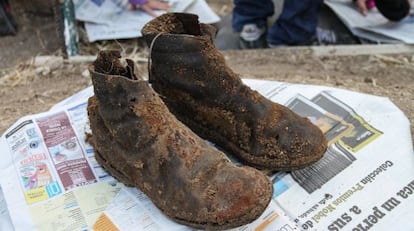UN gives Spain 90 days to explain how it will help victims of Franco regime
Expert group’s recommendations, which include creating a truth commission, are not binding


A United Nations group of experts is giving Spain 90 days to explain how it is going to help the victims of Franco’s regime.
The UN Working Group on Enforced or Involuntary Disappearances on Thursday released a report following its fact-finding mission to Spain last September.
The study ends with a long list of recommendations and a request for a “schedule indicating the measures that will be taken.” The deadline for turning in this list is 90 days.
The Working Group, which answers to the UN High Commissioner for Human Rights, reminds Spain that it has the obligation to assume its responsibility under international law and the Declaration on the Protection of all Persons from Enforced Disappearance, which the country ratified in 2010.
Spain has the obligation to reply and explain why it will or will not take the advice
The report calls for “a comprehensive, coherent and permanent state policy” that will allow relatives of people who disappeared during the Civil War (1936-1939) and the subsequent dictatorship to find out what happened to them and recover their remains.
Mission members concluded that given the time that has elapsed since most of the enforced disappearances began taking place, and the advanced age of many of the witnesses and relatives, “it is urgent for the state to adopt as an immediate priority the search for truth, and in particular the fate and the location of disappeared persons.”
The Working Group has sent Spain 42 recommendations and is offering assistance. Report author Ariel Dulitzky told EL PAÍS that the most “urgent” measure of all is for “the state to assume its responsibility and draft a comprehensive policy to bring truth and justice to the victims.”
Asked what will happen if the Spanish government invokes the economic crisis as an excuse to reject the recommendations, Dulitzky said that the matter was “not an economic issue, this is about political will. If [Spain] refuses, we will keep insisting, but for the moment we have hope.”
The Working Group normally visits countries at the invitation of the government, as was Spain’s case, and occasionally at its own request.
Some of the specific recommendations include greater government and financial support for victims’ associations and families, including the creation of a state agency to coordinate all related issues and of a national database of people who disappeared.
The report also asks for judges to be present during the exhumations of graves to ensure that the human remains will be analyzed and the pertinent steps will be taken. Right now, relatives say that they report cases of bodies found displaying signs of violence to the courts, but that they almost never receive a reply.
The expert group also reminds the Spanish government of its obligation to take down all symbols of Franco’s regime, asks for greater efforts in identifying people who may have been stolen from their mothers as babies, and recommends creating an independent truth commission to find out what happened during the Civil War and dictatorship.
While the recommendations are not binding, Spain has the obligation to reply and explain why it will or will not take the advice.
Tu suscripción se está usando en otro dispositivo
¿Quieres añadir otro usuario a tu suscripción?
Si continúas leyendo en este dispositivo, no se podrá leer en el otro.
FlechaTu suscripción se está usando en otro dispositivo y solo puedes acceder a EL PAÍS desde un dispositivo a la vez.
Si quieres compartir tu cuenta, cambia tu suscripción a la modalidad Premium, así podrás añadir otro usuario. Cada uno accederá con su propia cuenta de email, lo que os permitirá personalizar vuestra experiencia en EL PAÍS.
¿Tienes una suscripción de empresa? Accede aquí para contratar más cuentas.
En el caso de no saber quién está usando tu cuenta, te recomendamos cambiar tu contraseña aquí.
Si decides continuar compartiendo tu cuenta, este mensaje se mostrará en tu dispositivo y en el de la otra persona que está usando tu cuenta de forma indefinida, afectando a tu experiencia de lectura. Puedes consultar aquí los términos y condiciones de la suscripción digital.








































